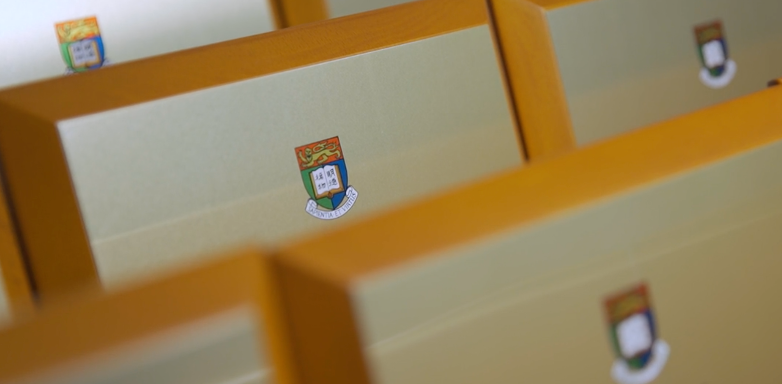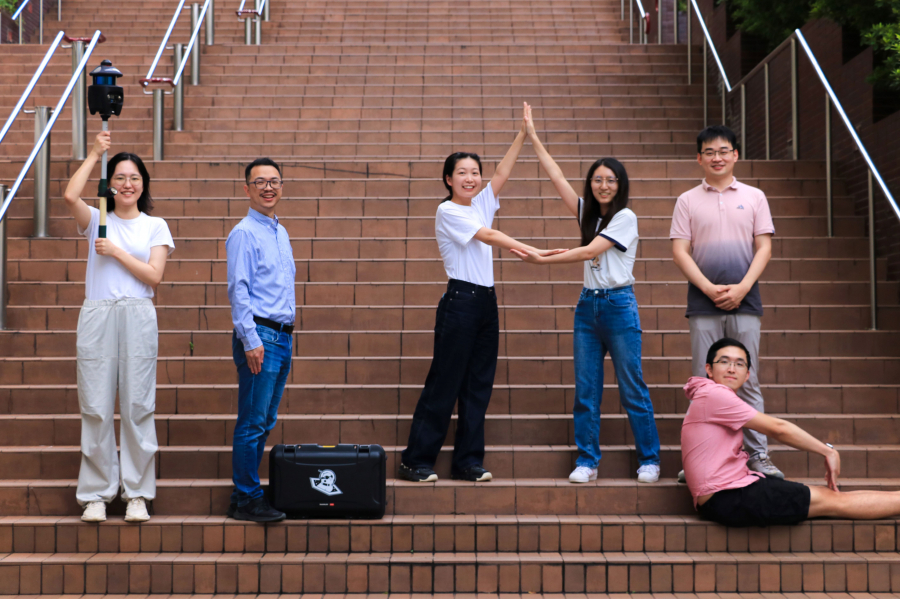

{{'Newsletter' | t}}
HKU Team Wins a Gold and a Silver at the 2023 Conference on Computer Vision and Pattern Recognition

Dr Frank Xue (second from left), Ms Yijie Wu (second from right, back row), Mr Dong Liang (first from right, back row), and the iLab team.
Ms Yijie Wu and Mr Dong Liang—PhD students from the Department of Real Estate and Construction, supervised by Dr Frank Xue, Professor Anthony Yeh, and Professor Wilson Lu—beat competition from the world’s leading universities to win a gold medal in the 3D track and a silver medal in the 2D track of the 3rd International Scan-to-BIM Challenge at the 2023 IEEE/ CVF Conference on Computer Vision and Pattern Recognition (CVPR).
The annual event, co-sponsored by the IEEE Computer Society Institute of Electrical and Electronics Engineers and the Computer Vision Foundation, is regarded as one of the most important conferences in its field. The winning methods, Space-voxel-guided Boundary Adaptation to Semantics Ensemble – Multi-start Optimization (SBASE-MO) for the 3D track and Floor Layer-based Kernels and Pillars of Points++ (FLKPP++) for the 2D track, were developed by Yijie and Dong with the iLab team led by Dr Xue. The methods integrated multiple state-of-the-art deep neural networks and architectural grammars, showing potential for fully automatic Scan-to-Building Information Modelling (BIM).
Yijie first joined iLab in 2020 as a research assistant and then as a PhD student in the field of architecture, engineering, and construction (AEC). She has been participating in the Scan-to-BIM Challenge for three consecutive years since 2021, when she and her supervisor published a self-developed Scan-to-BIM algorithm named ‘RegARD’. “The 1st Scan-to-BIM Challenge at CVPR 2021 offered a large-scale benchmark dataset of point clouds, 2D floorplans, and 3D BIMs,” Yijie recalled. “The challenge opened my mind and provided us with an exciting opportunity to test our paper and develop improved algorithms regarding real-world diversity and complexity.”
Since then, both the size of their research team and the maturity of their framework have grown exponentially. In 2022, they proposed a framework integrating the two previously independent designs and won the third and second places in the 2D and 3D tracks respectively. This year, their mature framework can flexibly employ domain-free state-of-the-art deep neural networks and domain-specific pre- and post-processing for AEC, beating the Tsinghua-CBIMS team and winning a gold medal in the 3D track.
“When I reviewed this three-year journey, I felt like we had gradually unfolded the extremely difficult Scan-to-BIM from isolated research directions, to integrated frameworks embracing the merits of various research directions, to research focuses on well-articulated theoretical issues that necessitate cross-disciplinary teamwork,” Yijie shared. “Beyond the awards of the challenges, this long-running research experience also generously awarded my patience and persistence with fruits of deeper insights, a more open mind, more willingness to cooperate, and more mature implementation skills. Not to mention that those coding and testing nights, full of confusion and seemingly dead ends, then moments of excitement when an idea was proven to work, as well as my very hard-working and supportive supervisors and colleagues, will keep shining in my memories and encourage me to go further.”
Yijie is now in Year 3 of her study. Her research interests include point cloud processing, BIM, and digital twinning of buildings and cities. Dong is now in his second year. His research interest focuses on modelling time-dynamic 4D point cloud for digital twinning construction sites.
Click here to learn more about their winning project.

Framework of the winning methods for the 2023 Scan-to-BIM Challenge

Ms Yijie Wu (middle), Mr Dong Liang (right), and their supervisor Dr Frank Xue (left).

Ms Yijie Wu (middle) with her PhD supervisor Dr Frank Xue (left), and 2022 Scan-to-BIM Challenge team member.
